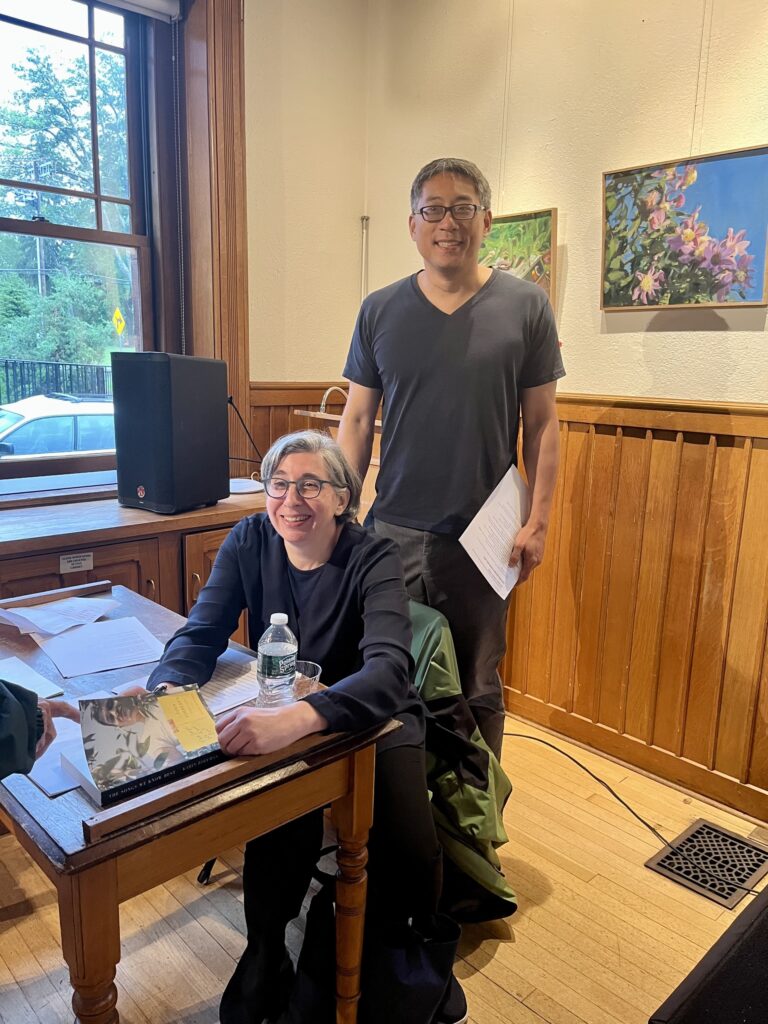A Haystack Book Festival Discussion of One Poet’s Insights into Music and Poetry

By Leila Javitch
In early July, the Haystack Book Festival hosted a talk on the musical interests of the distinguished American poet John Ashbery. Karin Roffman, author of “The Songs We Know Best: John Ashbery’s Early Life” and currently completing a full biography of Ashbery, was accompanied by Melvin Chen, director of the Norfolk Chamber Music Festival, who played parts of some of Ashbery’s favorite works on the piano. Roffman and Chen, who are married and teach at Yale University, approach poetry and music in a collaborative and creative manner—a treat for the large audience assembled at the Norfolk Library.
John Ashbery, whose life ran from 1927 to 2017, was considered one of the greatest American poets. He won almost every major American award for poetry, including the Pulitzer Prize and the National Book Award. He also received a MacArthur “genius” award. But his poetry is difficult to comprehend and so he isn’t as widely read as he might be. Roffman’s description of Ashbery’s passion for classical music, in particular, and his attempts to use various musical structures—not only titles, allusions and descriptions, but also musical structures, which he referred to as “the logic of music”—in many of his poems was enlightening as well as challenging.
Ashbery had an extraordinary ear for music, although he did not have much formal musical training. He could remember almost any piece he heard, and he listened to pieces he loved repeatedly. He admired composers of the 17th and 18th centuries, like Couperin and Bach. He adored Beethoven and Schumann, as well as lighter French music, such as that composed by Erik Satie. Moreover, he was fascinated by modern masters, such as Anton Webern and Eliott Carter.
Essentially, Ashbery was absorbed by the connections between all forms of music, poetry and visual art. He held the deep conviction that music was the highest form of art: “the language that words aspire to but can never achieve,” to quote Roffman. He liked to imagine how a piece of music that he loved and could hear in his head would sound if it were written words. Sounds, in Ashbery’s view, could matter more in a poem than any fixed definition or meaning of the words.
Roffman and Chen shared several examples of the connections Ashbery made between poetic and musical forms and his constant attempts to create verse that approached one’s experience of music. One especially interesting example was a recording of Ashbery’s “reworking” of Carter’s “Duo for Violin and Piano.” Ashbery was present at the premier of this piece in 1975. In the performance, Carter positioned the violin and piano at opposite ends of the stage to visually emphasize the separation of the instruments’ voices. In Ashbery’s long, three-part poem “Litany,” two separate poems descend the page in two distinct visual columns. But read aloud, together, each voice achieves a kind of counterpoint, and the strands of verse overlap in an almost choral manner. In summary, Roffman’s talk suggested the complexity of Ashbery’s taste in music and his goals for how poetry might achieve “the condition of music” which, for him, was the highest value of art and an experience that transcended any kind of verbal analysis. Chen’s accompaniment on the piano was delightful and strong evidence that music, indeed, has an easier avenue to an indefinable glory and mystery in art. It was a most unusual and thought-provoking discussion.
